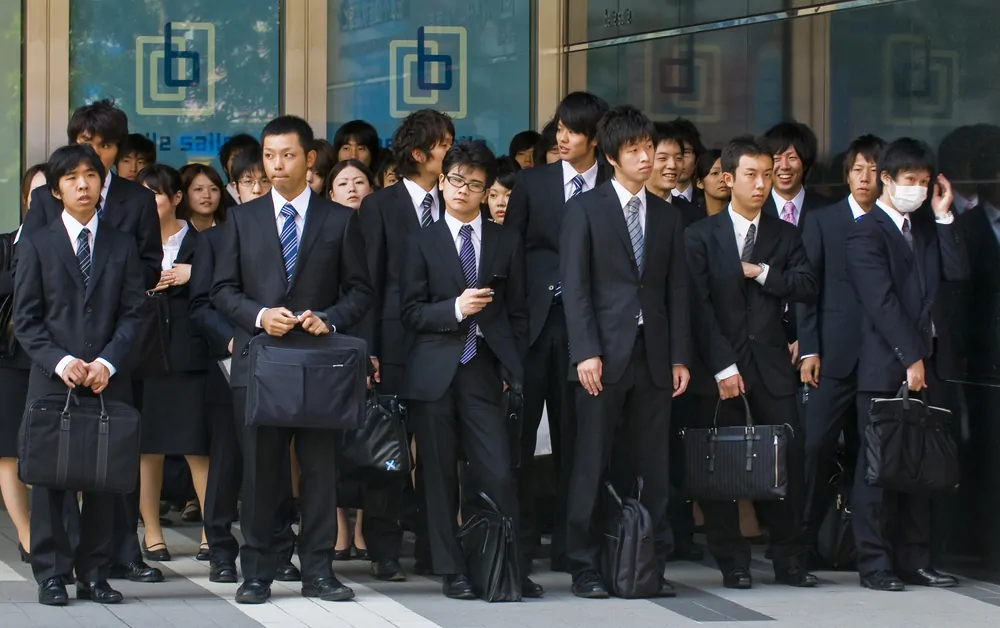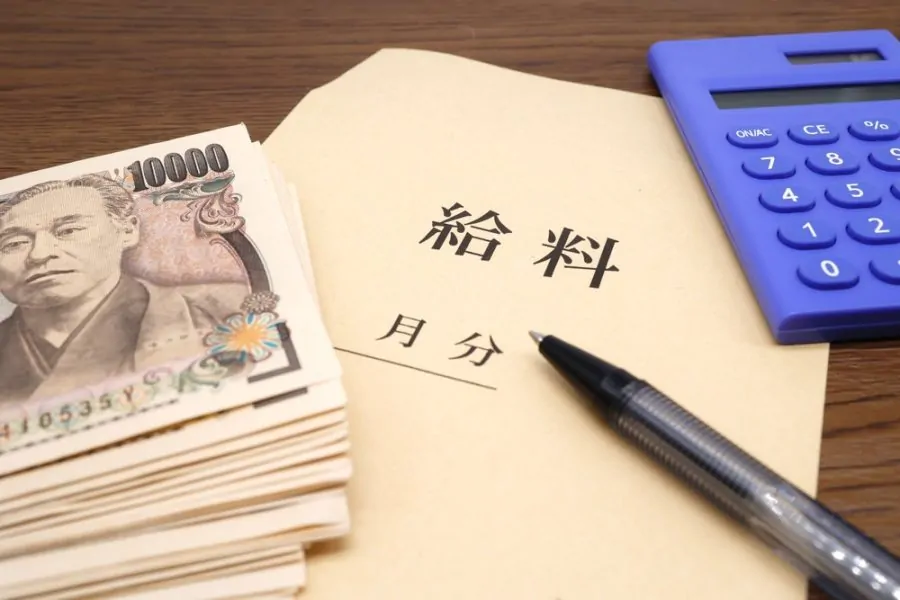The salaryman holds a position of prominence in Japanese culture and is one of the defining aspects of Japanese work life from an outside perspective.
The singular ideal of the traits a corporate employee should embody has attained widespread notice and recognition since its introduction in the early 20th century.
Keep reading for a detailed look at the salaryman phenomenon, including its origins, popular representations in the media, and the potential health consequences of living this high-pressure lifestyle.
What Is a Salaryman?
“Salarymen” are salaried workers in Japan’s corporate sphere. They are expected to work grueling hours, including regular overtime shifts, and to prioritize their jobs and employers over everything else.
These commitments continue into workers’ leisure hours; salarymen are expected to drink, sing karaoke, and patronize restaurants and bars with their colleagues rather than with friends or family.

Salarymen are expected to work for the same company their entire lives. They are rarely fired and receive rewards for their loyalty and good performance, though stressful working conditions and high-pressure corporate culture often counterbalance these benefits.
The word salaryman refers to government employees and people working in business firms or major corporations. Doctors, teachers, lawyers, engineers, and other professionals are excluded, as are nightlife workers and entertainers – even those earning salaries rather than an hourly wage.
Though upper-class families and the more conservative pockets of Japan continue to uphold the salaryman as the ideal standard for their sons, modern Japanese youth are showing signs of eschewing these traditions in favor of a healthier work-life balance.
Origins of the Salaryman
White-collar employment in Japan saw its growth accelerate dramatically in the 1930s due to rapid militarization and government expansion. However, the term “salaryman” was already popular as early as the 1920s.
As a geographically isolated, relatively homogenous island nation, Japan has historically shown a cultural inclination toward standardization and uniform, deeply entrenched practices across most spheres, including education, family life, and business.

As militarism and fascist imperialism grew ever more prominent from the 1890s through the end of World War II, the importance of showing dedicated service and total loyalty to authority figures was also heightened.
These factors, in combination, may help explain the salaryman’s rise to prominence as the ultimate model for corporate employees, an ideal to strive for and prioritize above all else.
However, the catalyst for Japan’s modern emphasis on the importance of dedicating one’s life to one’s work can be traced to the staggering reparations the country was ordered to pay following its defeat in World War II.
The economy was forced to kick into overdrive to stay afloat. Thus, the salaryman became a folk hero dedicated to serving his country by pouring all his energy into performing his corporate job.
Salarymen in Present-Day Japan
Salarymen present a paradox in modern Japanese culture. On the one hand, boys from upper- and middle-class families are expected to become salarymen, and those who reject the lifestyle are often considered failures.
However, the expectation that salaried workers will dedicate their entire lives to their employers – even spending their “free time” socializing with coworkers – has inspired an array of derogatory nicknames, including kaisha no inu (“company’s dog”), kigyou senshi (“corporate soldier”), and shachiku (“corporate livestock”).

Gender issues have also risen to prominence in modern discussions of salaried work. Women in Japan are often relegated to caretaking roles, and female employees in the corporate world frequently run up against outdated stereotypes and discriminatory policies.
Though uprooting gender biases in Japanese business culture constitutes an uphill battle, recent government legislation and youth movements centered on dismantling gender inequality in the workplace have begun to shift the narrative.
Health Consequences
It’s been well-documented that the salaryman lifestyle – which traditionally involves heavy social drinking as well as extended hours of work – is hugely taxing on the mind and body. According to Harvard Health, overworking can significantly increase the risk of heart attack and stroke.
Researchers at University College London found that employees who work more than 55 hours in an average week are 13% more likely to have a stroke than people who work 35-40 hours per week. The risk of stroke for overworked employees is as much as 33% higher than for employees working regular hours.
Salarymen frequently work more than 60 hours in a single week and often suffer from heart conditions, strokes, and mental health issues as a result.
Karoshi
The most severe consequence of life as a salaryman is a phenomenon called karoshi, or death by overwork. The first recorded instance of karoshi occurred in 1969 when an employee at a newspaper company died of a stroke at age 29.
Since then, the International Labour Organization has frequently voiced deep concerns about the dangers Japan’s debilitating workplace culture has on its working-age citizens.

Physical ailments aren’t the only cause of karoshi. The mental strain generated by overworking and occupational stress leads some salarymen to commit suicide. These victims of the corporate system are called karōjisatsu.
Karoshi and the disturbing prevalence of workplace-related suicides have contributed to the inclination among young Japanese citizens to reject their parents’ pressure to become salarymen.
Instead, Japanese youth have shown increasing interest in part-time and freelance jobs, preferring to spend more time with their friends and doing recreational activities instead of dedicating their lives to work.
Pop Culture and the Salaryman
Pop culture depictions of salarymen typically portray white-collar workers who are endlessly devoted to their corporate employers.
The phenomenon has been the subject of both serious and satirical characterizations in many forms of media in Japan and worldwide.
Manga

Salarymen are frequently featured in manga (Japanese graphic novels). Salary Man Kintaro’s manga series comprises more than thirty volumes dedicated to its motorcycle-gang-leader-turned-corporate-worker protagonist.
A comedic series called The Salaryman follows a hapless American who struggles to fit into the Japanese business world.
Movie

Many Japanese and foreign movie directors and documentary filmmakers have taken an interest in the salaried worker as a subject.
The legendary Japanese filmmaker Yasujirō Ozu made several films that commented on Japan’s growing consumerism and the monotonous existence of middle-class businessmen in the 1930s and 50s, including Ohayō (Good Morning) and the critically acclaimed Sanma no Aji (An Autumn Afternoon).
Thai filmmaker Wirat Hengkongdee’s 2012 comedy/drama film Super Salaryman offers a modern, satirical take on the stereotypical Japanese office worker. The film follows a group of white-collar workers under a high-pressure deadline to launch their company’s brand-new energy drink.
Television

Both animated and live-action TV shows feature salarymen as their main characters. The anime series Rīmanzu Kurabu (Salaryman’s Club) follows a pair of corporate employees who play for their company’s badminton team.
Netflix’s live-action comedy/drama series Kantaro: The Sweet Tooth Salaryman centers on a publishing house worker who slacks off from his job to eat sweets.
Video Games

YoYo Games publishes a morbid and irreverent series of puzzle platformers in which players help the main character, Mr. Karoshi, commit suicide. Titles in the series include Karoshi: Suicide Salaryman and Super Karoshi.
In Conclusion
Though its geographic isolation has made Japan historically less susceptible to global trends than most other countries, its cultural landscape has shifted since the dawn of the internet.
This interconnectivity and sharing of ideas have helped shine a light on the severely detrimental health consequences suffered by Japanese salaried workers, not to mention the lack of restoration and fulfillment afforded by their limited social lives.
Cultural norms that are rejected by the next generation are destined to dwindle and eventually die out. Rising interest in part-time employment may alter the business landscape in Japan and could someday relegate the salaryman to antiquity.
In the meantime, salarymen continue to be a point of fascination for foreigners, and the supremely dedicated businessman remains an ideal standard and the expectation for many Japanese citizens.
Frequently Asked Questions about Japanese Salarymen
A worker’s salary depends on their position within the company, age, education level, and how long they’ve been working. Typical salaries range from $40,000 to $100,000 US per year. Loyalty and hard work may be rewarded with bonuses, and most salarymen can expect their earnings to scale along with significant life events like getting married or buying a house.
Salarymen are white-collar government and corporate employees. Other workers who earn a salary but aren’t in business or government – teachers, law enforcement, or restaurant managers, for example – are not considered salarymen.
A salaryman is expected to work five or six days weekly for seven or eight hours daily, usually from 9 am to 5 or 6 pm. Due to the intense pressure, many workers remain in the office until 9 pm or 10 pm, and some work every single day.
Median salaries vary widely from industry to industry. The average full-time salaried worker makes approximately 307,400 yen per month, equivalent to roughly $2,367 US.





America in the 1920s-60s was similar to Japan with many workers staying with the same company for decades. My grandfather was a salaryman who worked for Singer Sewing Machine Company in Bridgeport, Connecticut, for fifty years from 1915 to 1965 and retired at 65.The “company man” as we say in USA was devoted and often their lives revo;ved around the company and even social functions like company picnics, ballgames, bowling teams, defined their lifestyles.
Now? Those days are “gone……..with the wind!” Obsolete, like company uniforms, newspapers, picnics, bowling teams, (gold watches at retirement) loyalty to employers, ………..too numerous to list as few young adults today want the “easy-life” without the strife! Bye Bye 1955!
Let’s not forget… U.S. wages have barely budged in decades. Young adults with 2 degrees and working still can’t afford a home. Not to mention the technology boom and the internet ended up causing us to work harder, faster and many more hours than the company men in the 1950s. We would rather walk dogs and bartend than be “loyal” to a greedy employer. But who’s to blame. Would love a gold watch though.
Ah yes! The easy-life where U.S. wages have barely budged in decades, and where the dollar today buys 7.9% of what it could back in your company man days!. Prices are 12.66 times as high as average prices since 1950. People with 2 college degrees and “loyal” ol’ salary jobs still can’t afford a home. Not to mention the technology boom and the internet ended up causing us to work harder, faster and many more hours than the company men in the 1950s and 60s. I can make more money walking dogs and bartending than at a greedy corporate landfill. Would love a gold watch though.
Great insight chop